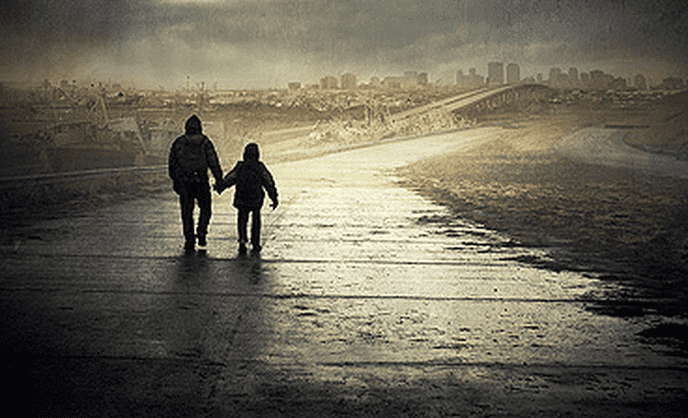The Nature of the Road
The first thing I imagine when I think of the word nature is actually the color green. From there I begin to construct an image of a vibrant and welcoming forest- the kind that inspires you to appreciate all of its beauty and forget about everything else. To me, nature is a safe space. It's alive. It's free.
An ideal depiction of nature.
Perhaps my idea of nature is inspired by all of the dystopian fiction novels I've read since I was a kid. The concept that nature is a safe haven in contrast to the separate identity that is humanity and its corruptness. I think it's difficult for people to think of the two, nature and humanity, as one and the same. Which is interesting from a new materialist perspective, considering that it advocates for a dissolution of binaries. I think a step in this direction is the fact that nature is also referenced as "mother". And in doing so, we personify the constructs we have of women and mothers on the entity of nature. Which makes sense in regard to how humanity treats nature- as a resource that complements and provides for us. One construct is that mothers are giving. They protect and provide for their children. They sacrifice. And in today's society, we sacrifice a lot of nature for the sake of our own selfish desires. But back to new materialism. In a sense, assigning the title of "mother nature" is a start to breaking down the barrier between nature versus humanity. In this portrayal, nature's agency is acknowledged by humanity. I think the current disconnect lies in people actually accepting the agency of nature. We can associate nature with characteristics of a mother, but in the end, it's hard for people to accept things that aren't tangible. Would society be just as neglectful and abusive if nature were a human entity?

A physical embodiment of mother nature- caring, protective, loving.
Ideally, we would say no. And I think this is a good bridge into Cormac McCarthy's The Road. Nature is dying. It's no longer a resource for humanity to extort. And as a result, a lot of people are dead or dying. Which is a contrast to most dystopias. Typically, we see nature as a helping hand and a place of comfort. Here, we see the true power of nature. In a way, it's like the saying, "oh, how the tables have turned". Nature is no longer the caring and supportive mother that we've come to rely on. She's no longer green with life. She's dying, and the world is bleak without her. And yet, she's more wild and powerful than ever. And the characters in this novel are all subject to her mercy. The father and his son must travel south so that they can stay warm enough to survive. There isn't a lot of food available, so instead of being able to harvest resources from the environment, a majority of the food that the characters eat comes from stored preserved food that people left behind.

The bleak world as imagined in McCarthy's The Road, in contrast to the ideal depiction of nature.
I think this novel did a good job of acting as a warning to humanity. Going back to the concepts of new materialism, and how important it is to recognize the value of nature. Because without it, we're pretty much screwed. And in today's society, we're in the fast lane heading straight towards our demise. In a way, McCarthy was able to change the image of nature from feminine to masculine. From being overlooked and taken advantage of as a woman, to the strength and power and respect that is associated with being a man. An example of this within the novel is the fact that the father and son duo used to have a plus one- the mother. The mother ended up killing herself because she didn't want to see her loved ones die. She's written off as weak. And yet the way I interpreted it, she was actually very brave. In a a dead and dying world with limited resources, she sacrificed herself for her family. If she had continued to travel with her husband and son, she would have been a liability. Another mouth to feed, another person to protect. And in the end, she would have been a distraction from the person she wanted to protect the most- her son. So in the end, she protected and sacrificed until the very end, similar to mother earth.
Like I said earlier, I think this is a warning for humanity. To respect nature enough to want to sustain it. And I like the way that McCarthy played the parent/child dynamic. Another construct we have for parents, is that they are meant to give their children a better life. And if anything, to give them an opportunity for a better life. Which is an issue in today's society. People are unbothered by the irreversible damage we are causing to the environment because they cannot see the immediate impacts. It won't be their children who are affected, it will be their children's children. And to imagine raising a child in McCarthy's world is both terrifying and heartbreaking thing to imagine.
Sources:
McCarthy, Cormac. Road, The. Pan Macmillan, 2006.
Sources:
McCarthy, Cormac. Road, The. Pan Macmillan, 2006.

Comments
Post a Comment